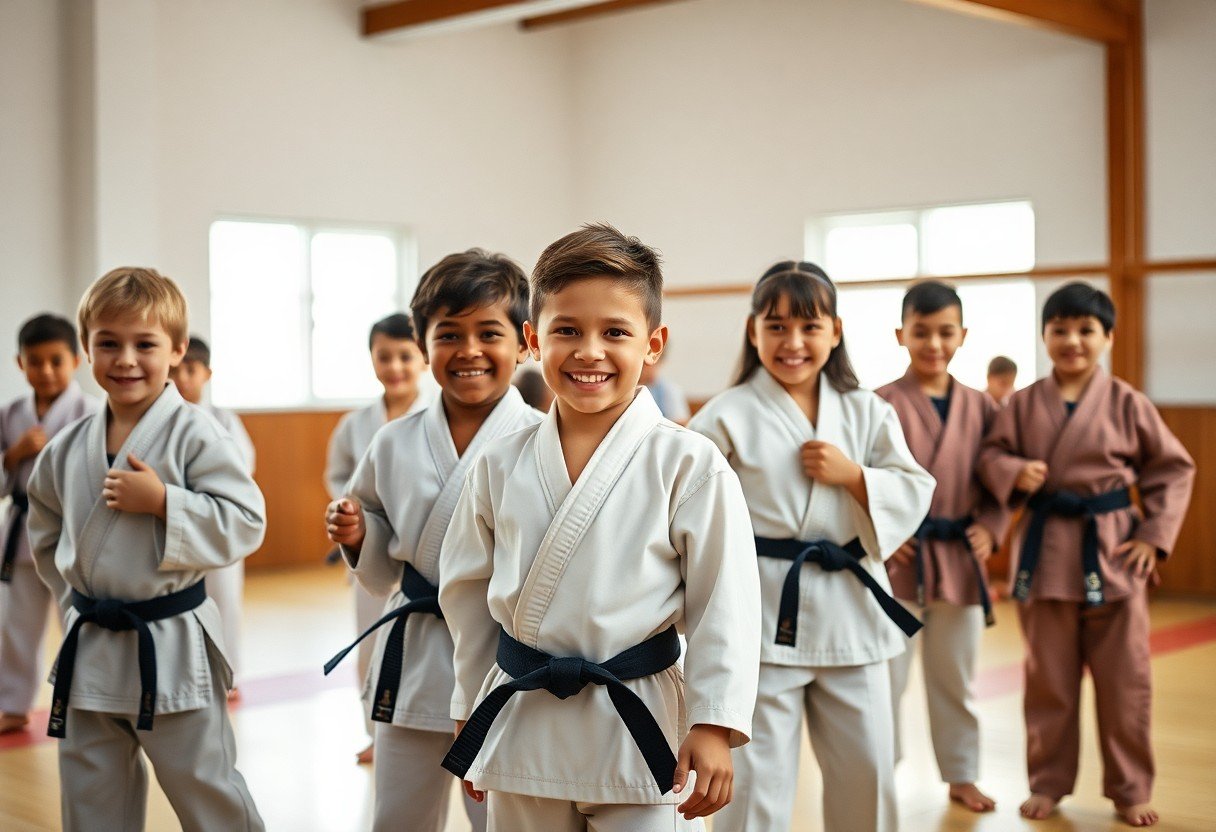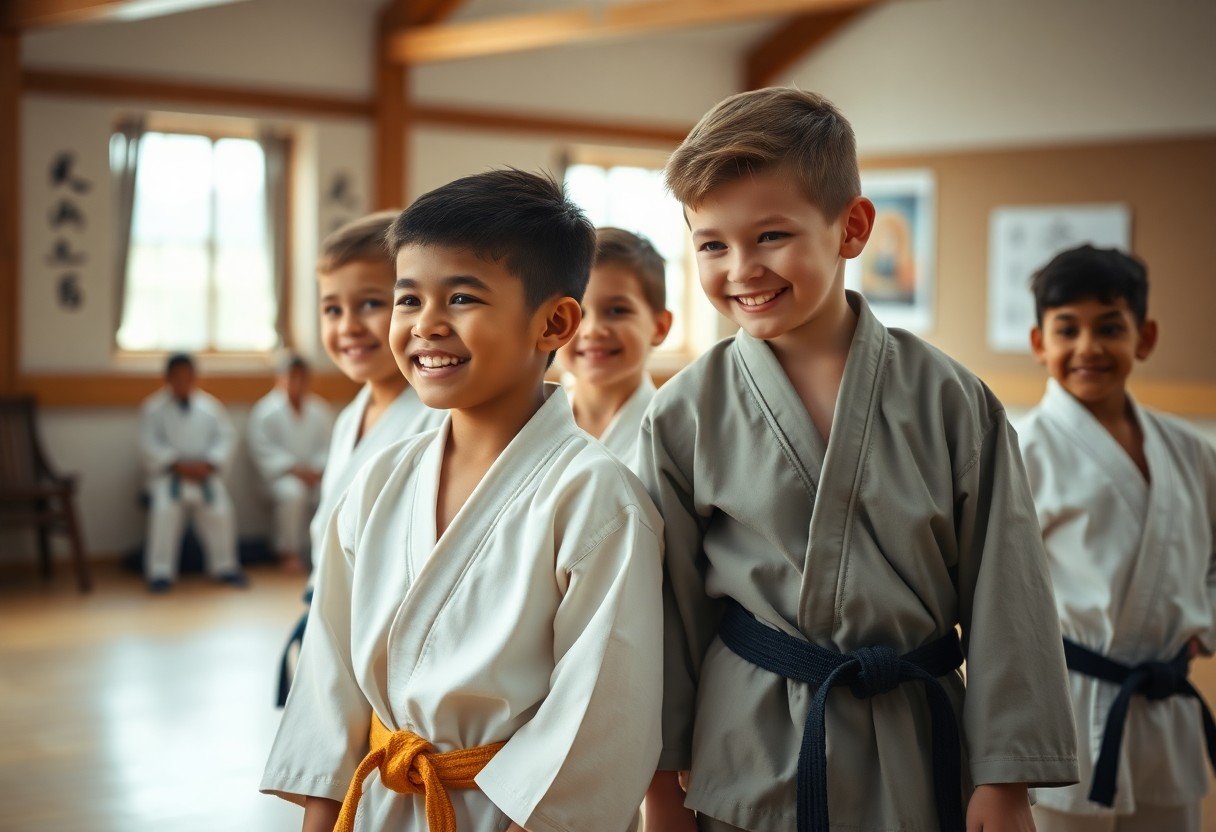Friendships can significantly flourish through martial arts, as they offer a unique environment for children to develop social skills while practising discipline. By engaging in martial arts, your child will interact with peers, enhancing their communication abilities and building confidence. The structured setting encourages teamwork, respect, and empathy, all of which are necessary for cultivating strong friendships. Additionally, the challenge of learning new techniques fosters resilience, teaching kids how to cope with both victories and setbacks in a supportive atmosphere. Explore how martial arts can enrich your child’s social experience.

Understanding Martial Arts
For many individuals, martial arts represents more than just a form of physical activity; it embodies a way of life that promotes discipline, respect, and self-improvement. You will discover how engaging in martial arts can significantly enrich your child’s personal development, enhancing their social skills while fostering new friendships.
Overview of Martial Arts Disciplines
Martial arts encompasses a wide array of disciplines, each with unique techniques and philosophies. You may encounter forms such as Karate, Taekwondo, Judo, and Brazilian Jiu-Jitsu, all offering different styles of movement, training regimes, and cultural elements. These varied techniques facilitate not only physical fitness but also the development of mental resilience and self-awareness.
History and Philosophy of Martial Arts
Around the world, martial arts has evolved over centuries from ancient traditions into various modern forms. It is important to understand that the practice often stems from a rich historical context, advocating values such as honour, respect, and personal growth.
Plus, the history of martial arts reveals its profound roots in ancient cultures, where it served not just as a means of self-defence but also as a path to spiritual enlightenment. Many martial arts embody a philosophy of respect for oneself and others, emphasising the importance of discipline and mental fortitude. This combination ultimately leads to improved social skills, enabling you to engage positively with peers and instilling in your child an understanding of shared values and camaraderie.
Social Skills Development
The impact of martial arts on children’s social skills development cannot be overstated. Participating in martial arts classes allows children to engage with peers and instructors, fostering an environment where they can practice vital interpersonal skills. As they learn self-discipline, respect, and patience, your child will naturally enhance their capability to interact positively with others, forming stronger bonds and friendships.
Communication Skills Enhancement
Development in communication skills is a significant benefit of martial arts training. Engaging in classes requires your child to listen attentively and follow instructions, promoting active listening. They also learn to articulate their thoughts clearly while interacting with instructors and peers, building confidence in their ability to express themselves effectively.
Teamwork and Cooperation in Martial Arts
An vital aspect of martial arts training is the emphasis on teamwork and cooperation. As your child trains alongside others, they discover the importance of working together towards shared goals, enhancing their ability to collaborate with teammates. This not only leads to greater success in martial arts but also cultivates a sense of community and belonging.
Skills developed through teamwork in martial arts are invaluable throughout life. Your child will learn the art of collaboration, as they must rely on their peers during group exercises and sparring sessions. Furthermore, they experience the importance of supporting one another to achieve common objectives, which fosters a deep sense of trust and camaraderie. These experiences teach your child to appreciate diverse perspectives and the value of unity in overcoming challenges, shaping them into well-rounded individuals.
Building Friendships through Martial Arts
Even in a physical discipline like martial arts, the opportunity for forging meaningful friendships is significant. Training together, sharing challenges, and encouraging one another through progress helps children develop strong social connections. The camaraderie built on the dojo mat can lead to lifelong friendships, as kids learn to support and trust each other while working towards common goals.
Creating Bonds with Peers
Bonds formed in martial arts classes can be profound. From sparring partners to fellow students assisting in technique drills, the interactions foster a sense of belonging and teamwork. These shared experiences promote empathy and cooperation, allowing children to grow not only as martial artists but also as socially adept individuals.
Role of Sensei and Community in Friendship Development
Along with peer interaction, the guidance of a sensei plays an integral role in nurturing friendships among students. A sensei not only teaches techniques but also fosters a healthy environment where mutual respect and support are emphasised, encouraging kids to connect. The dojo community further enhances this growth by providing a welcoming space for kids to interact across different age groups and skill levels.
Indeed, the role of your sensei and the broader dojo community significantly influences friendship development in martial arts. A dedicated sensei serves as a mentor, encouraging camaraderie and respect while highlighting the importance of collaboration. Such an environment nurtures friendships that transcend the dojo, often leading to social events, study groups, or projects outside of martial arts. As a result, children learn the value of supporting one another and understanding diverse perspectives, ultimately enriching their social skills and enhancing their overall development.
Emotional Growth and Confidence
Once again, martial arts has proven to be a nurturing ground for children’s emotional growth and confidence. By participating in these disciplines, kids learn to face challenges head-on, enabling them to develop self-assuredness and a better understanding of their feelings. Engaging in these activities can significantly enhance their social interactions and friendships. For further insights, explore How Martial Arts Enhance Kids’ Social Skills and Friendships.
Building Self-Esteem through Martial Arts
Growth in self-esteem is one of the most significant benefits martial arts can provide for children. Through mastering new skills and achieving personal goals, your child can experience a sense of accomplishment that fosters a positive self-image.
Resilience and Emotional Regulation
Arts such as martial arts teach kids how to bounce back from setbacks, enabling them to deal effectively with their emotions. The structured environment provides opportunities for them to cope with challenges, increasing their emotional fortitude.
Martial arts training promotes remarkable resilience and aids in emotional regulation. Through each lesson, your child learns to manage their feelings, combat frustration, and develop tolerance for adversity. This consistent practice not only prepares them for the physical demands of the sport but also equips them with life skills. Nurturing these qualities means that, as they navigate friendships and social situations, they will approach difficulties with a more balanced and composed mindset.
Parental Involvement and Support
Unlike other extracurricular activities, martial arts deeply benefits from Martial Arts Builds Social Skills & Friendships. By actively engaging in your child’s martial arts journey, you can boost their confidence and enhance their social interactions with peers. Open lines of communication about their experiences in class and supporting their participation can foster a positive environment that encourages the development of friendships and imperative social skills.
Encouraging Participation
One effective way to nurture your child’s social skills is by encouraging them to participate in martial arts classes. By introducing your child to a variety of training opportunities, they can engage with their peers, learn teamwork, and build lasting friendships.
Role of Parents in Creating a Positive Environment
An imperative aspect of fostering a supportive atmosphere is your attitude towards martial arts. When you show enthusiasm and encouragement, your child is more likely to feel motivated and engaged. This positive reinforcement lays the groundwork for your child to thrive socially.
For instance, attending classes regularly and showing interest in their progress can significantly improve your child’s sense of belonging. Engaging with other parents and forming friendships among the community not only benefits your child but also yourself. Providing consistent support and encouragement creates a nurturing environment where your child feels valued and secure, enabling them to develop vital social skills and friendships through martial arts.
Research and Studies on Martial Arts and Social Skills
Not all activities are created equal when it comes to enhancing children’s social abilities. Numerous studies indicate that martial arts training significantly contributes to the development of confident communication and teamwork skills. This physical discipline not only fosters respect and discipline but also promotes a sense of belonging among peers, which is vital for healthy friendships.
Key Findings from Recent Studies
After analysing data from various research studies, one can conclude that children engaged in martial arts show improved behaviours in social situations. Programs often incorporate elements such as self-control and empathy, which are vital in creating meaningful relationships and resolving conflicts amicably.
Implications for Parents and Educators
Around the globe, educators and parents are recognising the advantages of martial arts in cultivating positive social interactions. By prioritising these activities, you enhance the likelihood of your child experiencing nurturing friendships founded on mutual respect and trust.
And as you consider the role of martial arts in your child’s life, it’s important for you to understand its profound influence on emotional intelligence. Engaging in martial arts not only teaches physical skills but also fosters vital qualities such as cooperation and adaptability. These attributes are vital for navigating social landscapes, making martial arts a worthwhile investment in your child’s development. Moreover, by supporting your child’s participation, you’re actively providing them with opportunities for personal growth that will benefit them in various social settings.
Summing up
Hence, engaging your child in martial arts can significantly enhance their social skills and foster meaningful friendships. The discipline, respect, and teamwork involved in martial arts practice provide a unique environment for your child to develop confidence and communication abilities. As they interact with peers, they learn valuable lessons in collaboration and empathy, aiding them in building lasting relationships. By investing in martial arts, you are not only promoting physical fitness but also equipping your child with vital life skills that will benefit them in various social settings.
FAQ
Q: How do martial arts classes promote social skills in children?
A: Martial arts classes provide a structured environment where children learn to interact with peers. They engage in partner drills, sparring, and group exercises that require cooperation, communication, and respect. This promotes teamwork and helps kids develop important social skills such as listening, sharing, and negotiating, which are invaluable in both friendships and everyday interactions.
Q: Can martial arts lead to lasting friendships among children?
A: Yes, martial arts can help foster lasting friendships. Children often train alongside their peers, creating a sense of camaraderie. The shared experiences of learning new techniques and overcoming challenges together can strengthen bonds. Additionally, many martial arts studios encourage social events and competitions that further allow children to connect and form friendships outside of class.
Q: What impact does martial arts training have on a child’s self-esteem and social confidence?
A: Engaging in martial arts can significantly boost a child’s self-esteem and social confidence. As they achieve new belt ranks and master techniques, children gain a sense of accomplishment. This increased confidence can translate into better social interactions, as they become more willing to engage with peers and express themselves in group settings.
Q: Are there specific martial arts that are more effective at improving social skills?
A: While many martial arts forms can enhance social skills, disciplines that emphasise partner work, such as Brazilian Jiu-Jitsu or judo, may have a more pronounced impact. These styles require children to work closely with others, promoting better communication and understanding. However, the key is the instructor’s approach to teaching, encouraging interaction, and social bonding amongst participants regardless of the martial art.
Q: How can parents support their children’s social development through martial arts?
A: Parents can support their children’s social development in martial arts by encouraging consistent attendance, facilitating interactions with peers, and participating in community events hosted by martial arts schools. Additionally, discussing lessons learned in class, such as respect and teamwork, can help reinforce social skills at home. It is also beneficial to celebrate milestones and progress in their martial arts journey, helping to build a positive social identity.



